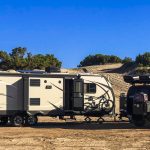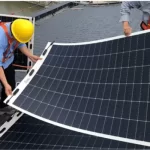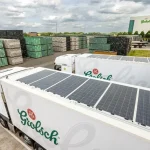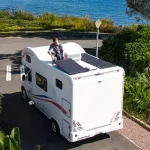When it comes to building your RV solar system, selecting the right type of solar system is crucial. One of the most important decisions is whether to opt for a low-voltage or high-voltage solar system. Both options come with distinct benefits and limitations, making it essential to understand which system aligns best with your needs and travel style.
Low-Voltage Solar Systems: Safety and Simplicity
Low-voltage solar systems operate below 48 volts and are commonly found in residential and small-scale commercial setups. These systems are known for their safety, simplicity, and ease of integration with standard battery storage systems. Here’s why a low-voltage solar system might be the right fit for your RV:
Advantages of Low-Voltage Systems
- Safety First: One of the standout benefits of low-voltage systems is their reduced risk of electrical shock, making them safer for those without advanced electrical knowledge.
- Ease of Installation: These systems are relatively simple to install, even for RV owners handling installation as a DIY project.
- Cost-Effective for Small Setups: For smaller RV systems, low-voltage solutions tend to be more affordable upfront, especially when paired with standard battery and inverter configurations.
Limitations of Low-Voltage Systems
However, low-voltage systems have their drawbacks:
- Scalability Challenges: Expanding a low-voltage system can be complex and expensive due to the increased need for wiring and other components.
- Higher Balance of System (BOS) Costs for Larger Setups: Larger installations require more equipment, driving up overall costs.
For RVers with modest energy needs or those prioritizing safety and simplicity, low-voltage systems can be a practical and cost-effective choice.
High-Voltage Solar Systems: Efficiency for Larger Applications
High-voltage solar systems, operating above 48 volts (often between 200 and 600 volts), are typically associated with large commercial or utility-scale installations. However, these systems are increasingly being adopted by RV owners with higher energy demands or larger setups.
Advantages of High-Voltage Systems
- Greater Efficiency Over Distance: High-voltage systems excel in minimizing energy loss during long-distance transmission, which is beneficial for larger RVs or setups with extensive solar arrays.
- Lower BOS Costs for Large Installations: With fewer required connections, high-voltage systems can reduce overall system costs, especially for extensive installations.
- Future-Proofing Your System: High-voltage setups often offer better scalability, making them suitable for RVers planning to expand their energy system over time.
Limitations of High-Voltage Systems
On the flip side, high-voltage systems come with significant challenges:
- Safety Concerns: Higher voltage levels necessitate strict safety protocols, which can be daunting for some RV owners.
- Complex Installation Requirements: Installing a high-voltage system often requires specialized equipment and expertise, adding to upfront costs.
If you’re managing a larger RV setup or planning long-term off-grid adventures, the efficiency and scalability of a high-voltage system may outweigh the initial investment and safety considerations.
Key Factors to Consider for Your RV Solar System
When deciding between low-voltage and high-voltage systems, consider the following factors:
1. Scale and Application
- Smaller RVs with moderate energy needs are well-suited for low-voltage systems, while larger RVs or those traveling extensively off-grid may benefit more from the efficiency and scalability of high-voltage systems.
2. Safety Requirements
- Low-voltage systems provide peace of mind for those concerned about electrical safety. However, with proper precautions and professional installation, high-voltage systems can also be implemented safely.
3. Cost Considerations
- For smaller setups, low-voltage systems are often more cost-effective upfront. For larger installations, high-voltage systems may offer greater long-term savings due to reduced BOS costs.
4. Technological Advances
- Emerging technologies, such as TOPCon solar panels, are narrowing the performance gap between low and high-voltage systems, making both options increasingly competitive regardless of the voltage level.
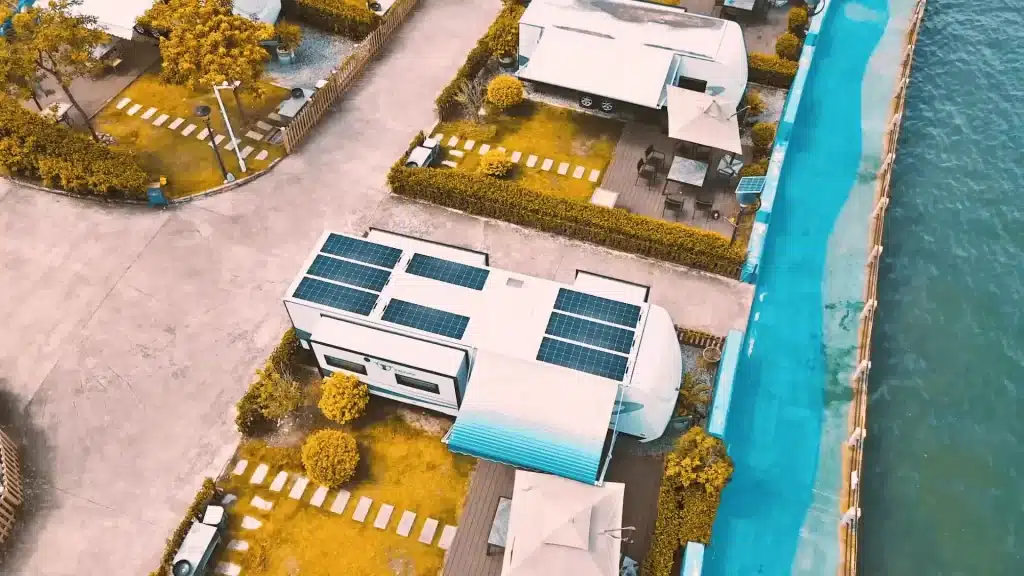
Making the Right Choice
Choosing the best solar system for your RV ultimately comes down to balancing your energy needs, budget, and comfort with installation and maintenance. Low-voltage systems are ideal for those seeking safety, simplicity, and affordability in smaller setups. Conversely, high-voltage systems shine for larger RVs or energy-intensive applications where efficiency and scalability are key.
By assessing your specific needs and considering factors like application scale, safety, and long-term costs, you can select the RV solar system that’s perfectly tailored to your adventures. Whether it’s a low-voltage system for simplicity or a high-voltage system for robust efficiency, solar power is an excellent investment in sustainable, off-grid living.




